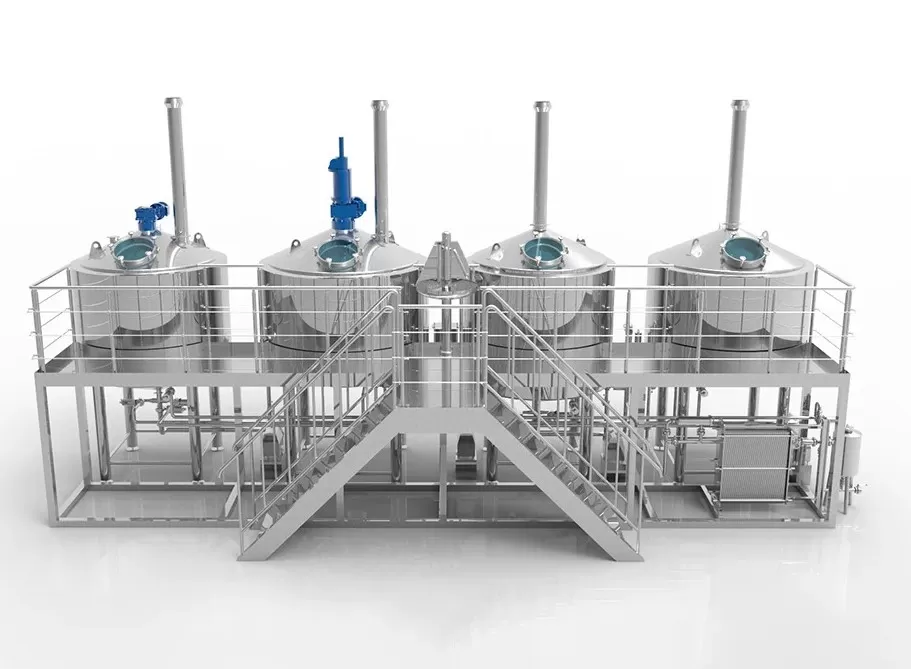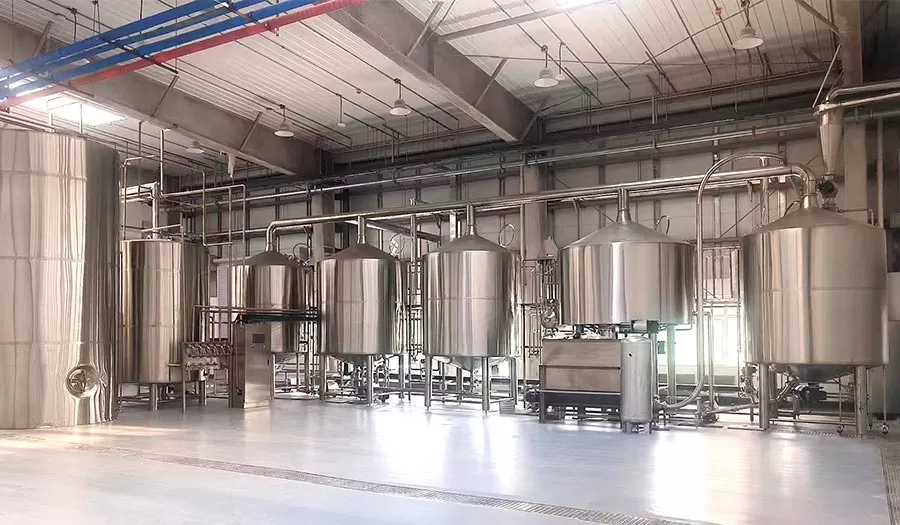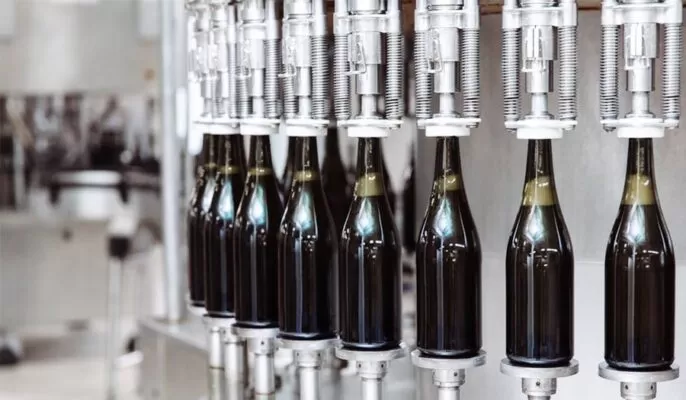The craft beer industry has been one of the fastest-growing areas of the entire beer industry, with a growing demand for high-quality beers. Breweries of all kinds are popping up. Many customers will discuss equipment configuration issues when consulting Micet engineers. Different craft beer equipment configurations will also affect the price of beer equipment. Micet tailors a complete set of standard craft beer equipment according to customer requirements. What does the standard craft beer brewery equipment include? Let’s read on.
Was ist eine professionelle Ausrüstung für Craft Beer?
Professionell Craft-Bier-Ausrüstung sind spezielle Anlagen für die großtechnische Herstellung von Bier und anderen vergorenen Getränken. Diese Systeme variieren in Größe und Komplexität, von kleinen Einheiten in Handwerksbrauereien bis hin zu großen industriellen Konfigurationen.
Ancient cultures brewed beer using basic tools and methods, but as the industrial age began, more efficient and standardized brewing systems were needed. Today’s professional brewing systems are a testament to centuries of innovation and refinement.
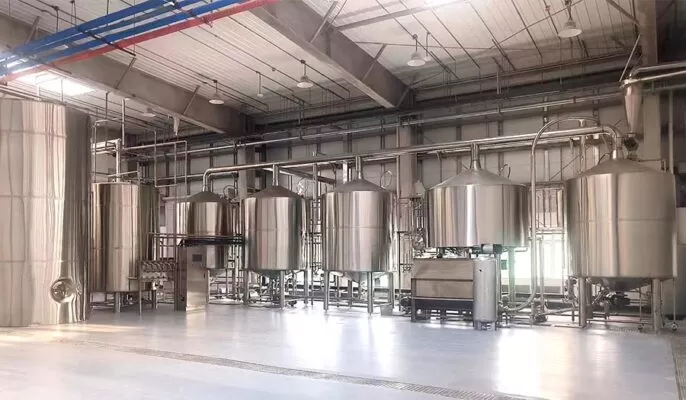
Professionelle Ausrüstung für Craft Beer
Die Einrichtung einer gewerblichen Brauerei erfordert eine sorgfältige Auswahl und Installation spezieller Anlagen für jede Phase des Bierherstellungsprozesses. Die Brauereianlagen sind das Herzstück des Brauprozesses. Sie umfasst verschiedene Komponenten wie Maischebottiche, Läuterbottiche, Sudkessel und Whirlpools, die zusammenarbeiten, um die Würze in Würze umzuwandeln. Der Prozess beginnt mit dem Vermischen von Malzmehl mit Wasser in einem Hydrator im Maischebottich. Nach einer bestimmten Zeit wird das Gemisch in das Läuterfass geleitet, wo es in flüssige Würze und Treber getrennt wird. Die Würze wird dann in einer Sudpfanne gekocht, und Hopfen und andere Zutaten werden zu bestimmten Zeiten hinzugefügt, um das gewünschte Geschmacksprofil zu erreichen.
Komponenten des Brühsystems
- Mash Tun: extracts sugar, starch, color and flavor from grains; mashing process – used to convert starch into sugar.
- Braukessel: Großer Edelstahlkessel, in dem die Würze mit Hopfen und anderen Zutaten gekocht wird.
- Vortex: Ein rotierendes Gefäß wird verwendet, um Hopfenfragmente und koagulierte Proteine von der kochenden Würze zu trennen. Nach dem Kochen werden Rückstände und Sedimente entfernt.
- Fermenter: Ein isolierter und temperaturgeregelter Behälter, der für die erste Gärung verwendet wird. Die Hefe wandelt Zucker in Alkohol und Kohlendioxid um.
- Filtersystem: Filtert Verunreinigungen heraus und sorgt so für Klarheit und Reinheit.
- Verpackungsanlagen: Abfüll-, Konserven- und Fassabfüllanlagen
Je nach den spezifischen Produktionszielen können weitere Spezialausrüstungen erforderlich sein, wie Getreidemühlen, Hefevermehrungsmaschinen, Abfüllmaschinen, Fasswaschanlagen, Etikettiermaschinen usw.
Professionelle Brühsysteme nach Größe
- Nano-Brauerei: Die Chargenkapazität beträgt 1-3 Fässer pro Charge, geeignet für selbst gebrautes Bier in Bars, Verkostungsräumen und kleinen Bars.
- Kleine Brauereien: Sie eignen sich perfekt für kleine gewerbliche Brauereien oder sogar für begeisterte Heimbrauer. Anlagen, die bis zu sieben Fässer (je 31 Gallonen) produzieren, können zwischen $15.000 und $100.000 kosten.
- Kleine Handwerksbrauereien: Eine Anlage mit einer Kapazität von 7 bis 15 Fässern kann zwischen $100.000 und $500.000 kosten.
- Regionale Brauereien: Jede Charge hat eine Kapazität von 15-6000 Fässern, geeignet für die Expansion kleiner Brauereien und den regionalen Vertrieb
- Großbrauereien: Für die kommerzielle Produktion in großem Maßstab haben diese Anlagen riesige Kapazitäten. Die Kapazität beträgt 6000+ BBL pro Charge, und große Handwerksbrauereien sind über das ganze Land verteilt.
- Spezialisierte Anlagen: Neben den regulären Brauprozessen gibt es auch spezielle Anlagen für bestimmte Biere wie Sauerbiere, Lambic-Biere oder alkoholfreie Biere. Ihre Preise können je nach Komplexität und Spezialisierung variieren.
Chargengrößen, Stückzahlen und Layouts können individuell angepasst werden, um bestimmte Produktionsziele zu erreichen. Mit dem Nano-System können Brauereien kleine Chargen vor Ort testen, während kleine Brauereien bei steigender Nachfrage mit weiteren Tanks aufstocken können. Für große regionale oder nationale Brauereien, die Tausende von Fässern pro Charge produzieren, steigen der Platzbedarf, der Energiebedarf und die Kosten.
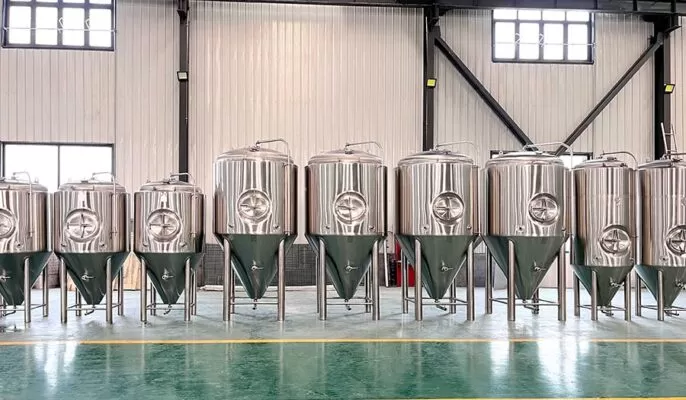
Professionelle Funktionen eines handwerklichen Brausystems
Professionelle Brausysteme integrieren diese Schritte und gewährleisten Effizienz, Konsistenz und Skalierbarkeit.
- Mashing: The first step is to soak the grains in hot water to activate enzymes that convert starch into fermentable sugars. The brewing system’s mash tun facilitates this process.
- Sieden: Die nach dem Maischen gewonnene Würze wird zusammen mit dem Hopfen in einem Kochtopf gekocht. Dadurch wird nicht nur das Aroma des Hopfens extrahiert, sondern die Würze auch sterilisiert.
- Abkühlung: Nach dem Kochen ist es wichtig, die Würze auf eine für die Gärung günstige Temperatur abzukühlen. Moderne Brausysteme sind mit effizienten Wärmetauschern ausgestattet, die den Kühlprozess beschleunigen.
- Gärung: Die gekühlte Würze wird in einen Gärbehälter umgefüllt, wo die Hefe zugegeben wird. Die Hefe verzehrt den vergärbaren Zucker und erzeugt dabei Alkohol und Kohlendioxid. Abhängig von der Biersorte, Gärung kann von einigen Tagen bis zu einigen Wochen dauern.
- Verpackung: Nach der Reifung wird das Bier gefiltert und gegebenenfalls mit Kohlensäure versetzt und dann in Flaschen, Dosen oder Fässer abgefüllt.
Professionelle Brauereianlagen nach Funktion unterteilt
| Funktion | Verwendete Ausrüstung |
| Fräsen | Walzenmühle, Hammermühle, Schrotkasten |
| Maischen | Maischebottich, Direktfeuer-Kessel, Dampfmantel-Kessel, Aufgusstank |
| Lautering | Läuterbottich, Maischefilter, Zuschuss |
| Würze kochen | Direkt befeuerter Kessel, Dampfmantelkessel, Whirlpool |
| Kühlung | Plattenwärmetauscher, Glykol-Kühler |
| Gärung | Uni-Tank, CCT, offener viereckiger Fermenter, Kegel- oder Topcropping-Tank |
| Reifung | Uni-Tank, Brite-Tank, horizontaler oder vertikaler Biertank |
| Filtrierung | Platten- und Rahmenfilter, Kieselgurfilter, Zentrifuge |
| Karbonisierung | Brite-Tank, Uni-Tank, Karbonisierungsstein |
| Verpackung | Flaschenabfüllanlage, Fasswaschanlage/Füllanlage, Dosenabfüllanlage, Beutelabfüllanlage |
| CIP | Sprühkugeln, Pumpen, Tanks, Reinigungschemikalien |
Darüber hinaus sind weitere Ausrüstungen erforderlich, z. B. für die Getreideverarbeitung, die Wasseraufbereitung, Labortestgeräte, Rohrleitungen, Dampf, Druckluft und Prozesssteuerungssysteme.
Anwendung eines professionellen Systems für handwerkliche Brauereiausrüstung
Die Vielseitigkeit professioneller Brausysteme ermöglicht es den Brauern, diesen vielfältigen Gaumen zu bedienen und eine Vielzahl von Bierstilen zu entwickeln.
Ale-Produktion
Ales umfassen eine Vielzahl von Biersorten, von IPAs bis zu Stouts. Ales werden bei höheren Temperaturen und unter Verwendung obergäriger Hefestämme vergoren. Angesichts der großen Beliebtheit und der verschiedenen Stile sind die meisten Brauanlagen für die Bierherstellung optimiert.
Bierherstellung
Bier wird bei niedrigeren Temperaturen mit untergärigen Hefestämmen vergoren. Sie benötigen eine lange Reifezeit, oft bei Temperaturen nahe dem Gefrierpunkt. Für Bier konzipierte Brauereianlagen verfügen über spezielle Gärbehälter und Kühlsysteme, die diesen Anforderungen gerecht werden.
Alkoholfreies Bier
Da die Nachfrage nach alkoholfreien Bieren weiter steigt, erforschen viele Brauereien diese Kategorie. Alkoholfreie Bierbrausysteme sind mit speziellen Geräten ausgestattet, die den Alkohol während des Brauprozesses entfernen oder begrenzen.
Selbstgebraute Bierbar
Viele Restaurants und Bars brauen ihr Bier vor Ort, um ihren Kunden ein frisches und einzigartiges Erlebnis zu bieten. Diese Unternehmen benötigen Brauanlagen, die nicht nur hochwertiges Bier produzieren, sondern auch zur Ästhetik des Unternehmens passen.
Wie wählt man ein professionelles Brühsystem aus?
Bestimmen Sie Ihre Größe
Bevor Sie sich mit den technischen Details befassen, sollten Sie die Größe Ihrer Brauerei bestimmen. Sind Sie eine Hausbrauerei, eine kleine Brauerei oder eine Großbrauerei? Die Größe Ihrer Brauerei bestimmt die Systemgröße, die Funktionalität und das Budget.
Haushalt
As with any major investment, budget plays a vital role. While it’s important to stay within financial limits, remember that quality often comes at a price. Weigh the system’s features against its cost to ensure you get the best value for your money.
Technische Unterstützung
Brühsysteme, insbesondere moderne Brühsysteme, können schwierig sein. Entscheiden Sie sich für eine Marke, die einen guten technischen Support bietet, sei es durch ausführliche Handbücher, eine Helpline oder Schulungen vor Ort.
Forschung über Brauereimaschinenmarken
Jeder Hersteller hat seine eigenen Merkmale und seinen eigenen Ruf. Micet ist für seine Automatisierungs- und kundenspezifischen Dienstleistungen bekannt und kann Ihnen helfen, die richtige Wahl zu treffen.



